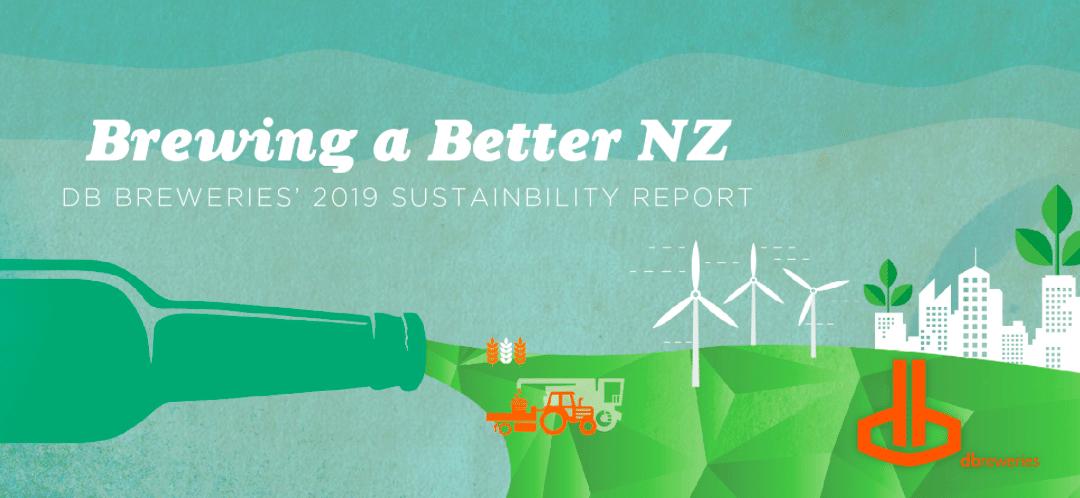Brewer diverts 96% of its waste from landfill, halving carbon emissions from production between 2008-2018
PR / New Zealand (July, 2020) – One of the country’s largest brewers has today released its annual Sustainability Report, which details its progress towards halving its emissions by 2030 and achieving zero waste to landfill across its operations.
The company removed 17 tonnes of plastic from its supply chain in 2019, part of an overall 10% reduction in its total waste since 2018. Of the remaining waste, 96% was diverted from landfill through various reuse and recycling initiatives.
“We speak often about consumers needing to reduce their waste, but in my view there isn’t enough pressure and progress from companies to do the same. We are one step further up the chain, so if we can reduce what we use at our level, it will have a significant impact,” commented Peter Simons, Managing Director of DB Breweries.
The drop in plastic use has been achieved via collaboration and innovation, with reducing stretch wrap on pallets one of the biggest changes. Tackling plastics will continue to be a priority for the company, with a focus on reducing and recycling onsite plastic, collaborating with suppliers, and sustainable packaging solutions.
As well as reducing plastic and diverting waste, DB reduced its carbon emissions by 11% in 2019. As a signatory to the Climate Leaders Coalition, the brewer has committed to halving its emissions by 2030[i] to align with the Paris Agreement to limit the global average temperature increase to 1.5° Celsius above pre-industrial levels.
“Our 2019 reduction alone is the equivalent to the annual emissions of over 140 Kiwi households[ii]. Everyone needs to play their role to reduce their individual footprints, but businesses need to be making a step change and leading the way,” Simons explained.
The 11% reduction is from Scope 1 and 2 emissions and is due to improvements in thermal energy use at the two largest production sites in Otahuhu and Timaru. Both sites have also reduced refrigerant losses by over 500 tonnes.
Measuring and reducing Scope 3, or indirect emissions, is also a priority for DB, who have committed to setting reduction targets for these emissions by the end of 2021. Actions to reduce these Scope 3 emissions are already underway; and the latest Sustainability Report reveals a reduction of 30,000km travelled in distribution in 2019, the equivalent of twice the distance around New Zealand’s coastline and a saving of over 25 tonnes of CO2 per year.
However, Simons is realistic about what to expect in 2020 with sustainability progress, given the context of COVID-19 and its economic fallout.
“We had significant plans this year to invest in the infrastructure required to further our sustainability goals, particularly in water quality and emissions. Obviously with COVID we are facing some challenges and uncertainty, but this hasn’t diminished our ambitions.
“The good news is that changes like reducing plastic, diverting waste, and increasing efficiency in production and logistics do not require huge levels of investment but do make a difference.”
DB’s business purpose, Brewing a Better New Zealand, centres on six key pillars, including reducing carbon emissions and water use, building a sustainable value chain, enhancing worker health, safety and wellbeing, and fostering a safe and social drinking culture. The work DB has done across these areas through 2019, and its future targets, are outlined in the 2019 Sustainability Report.
For more information on DB’s actions and commitments to Brewing a Better New Zealand, view the 2019 Sustainability Report at www.dbsustainability.co.nz.
Related: Why Two of the World’s Best Breweries Decided Not to Use Plastic Can Carriers

